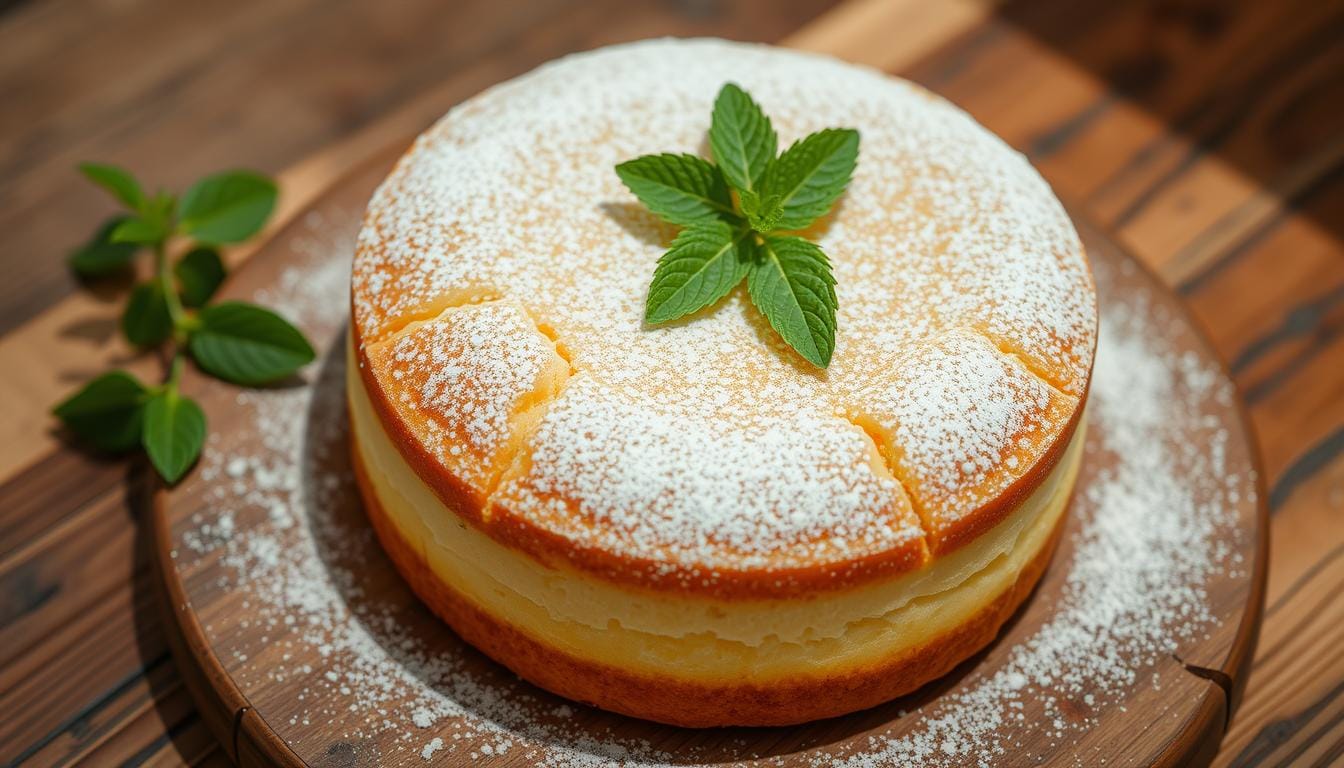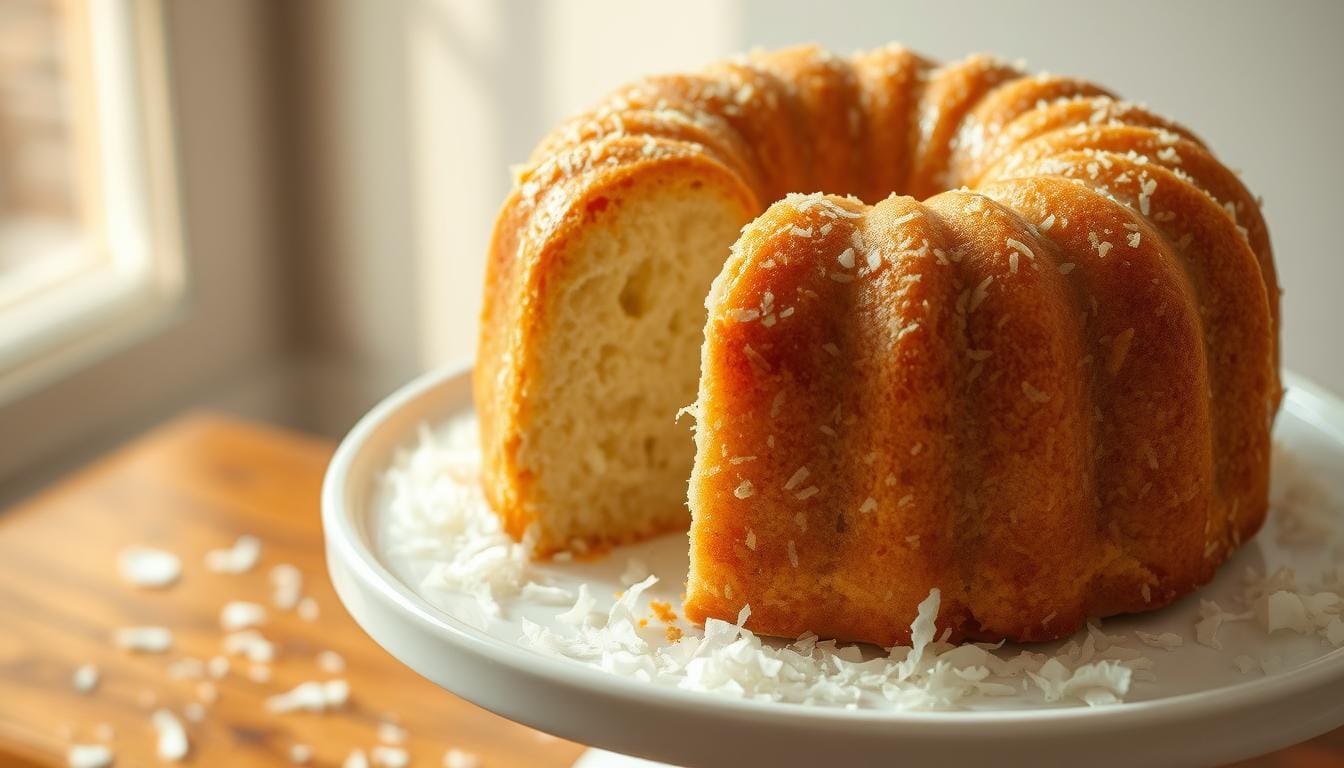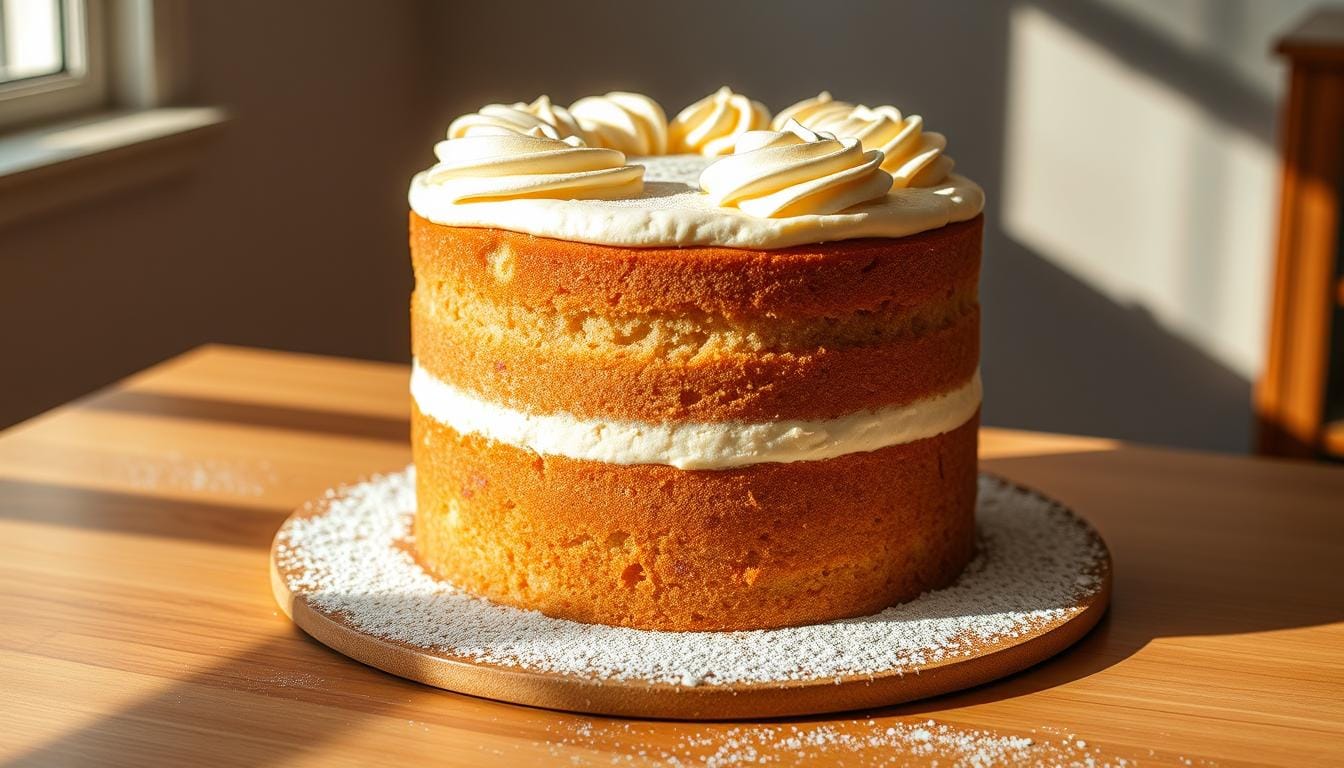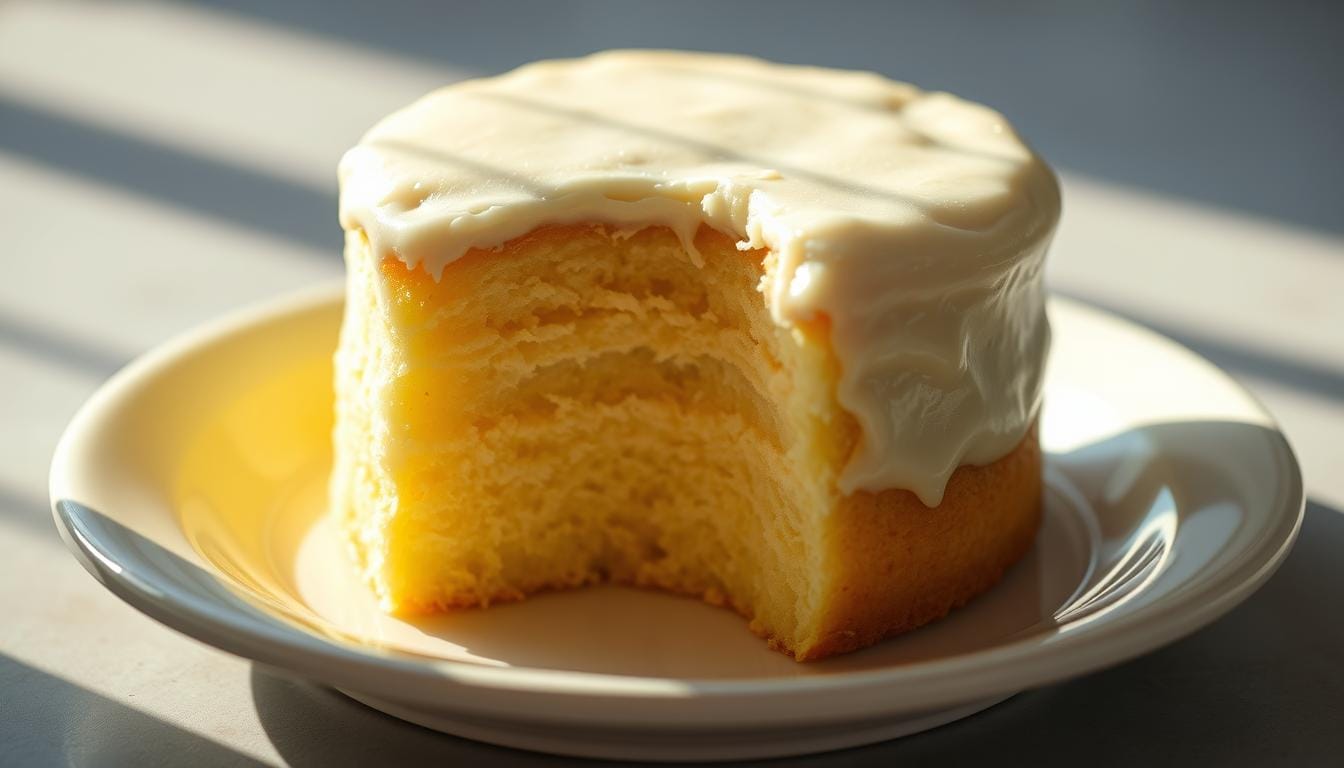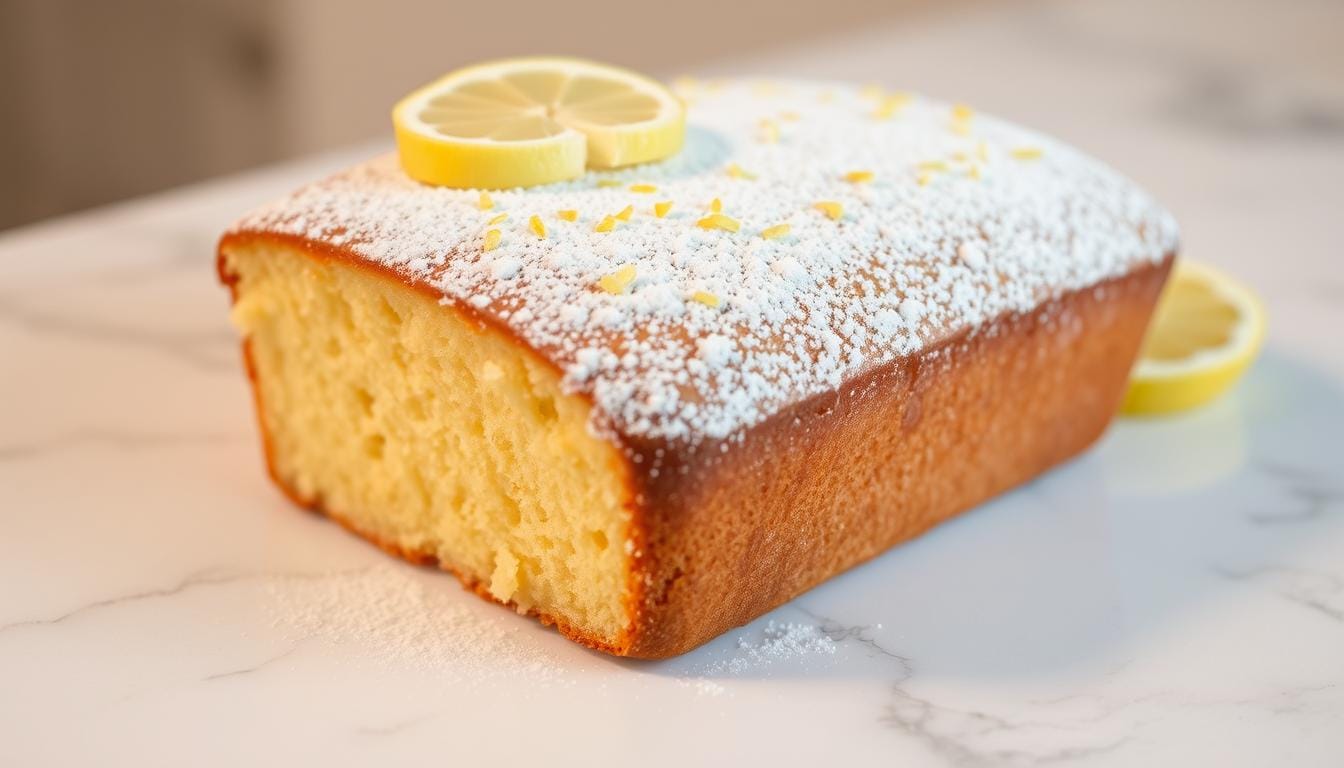Easy Homemade Vanilla Cake Recipe | Perfect Every Time
Table of Contents
Baking a perfect vanilla cake can make any day special. Every home baker wants to make a legendary vanilla cake that everyone loves. Our easy vanilla cake recipe shows you how to make a delicious dessert that makes everyone happy.
Imagine going into your kitchen with just a few ingredients and the confidence to make a tasty treat. This vanilla cake recipe is for all bakers, from beginners to experts. It’s perfect for any celebration or a sweet treat in the afternoon, and it always turns out great.
No need for complicated techniques or hard instructions. Our recipe makes baking easy with simple steps. With just a few ingredients and basic tools, you can make a cake that looks and tastes like it’s from a pro bakery.
Get ready for a fun baking adventure that will make your home smell amazing. Let’s start this easy recipe that will make you feel like a baking star!
Introduction to Vanilla Cake
Vanilla cake is a timeless favorite that has won the hearts of many. It’s more than a sweet treat; it’s a tradition that unites families and creates memories.
The Origin of Vanilla Cake
In the 18th century, European bakers found a secret to making a light and tasty cake. They mixed flour, sugar, eggs, and vanilla. Vanilla, from Mexico, made these cakes truly special.
Why You Should Bake Vanilla Cake
- Versatile and easy to customize
- Simple ingredients most home bakers already have
- Perfect for beginners and experienced bakers
- Crowd-pleasing dessert for all ages
Common Occasions for Vanilla Cake
Vanilla cake is more than a dessert; it’s a highlight of celebrations. It’s perfect for birthdays and weddings, bringing happiness to all. Its simple taste lets you add your own special touches.
Vanilla cake is for everyone, whether you’re new to baking or have years of experience. Its simplicity hides a rich history and appeal that spans generations.
Essential Ingredients for Vanilla Cake
Creating the perfect homemade treat starts with understanding your cake ingredients. A delicious vanilla cake needs high-quality components. These work together to make a moist, flavorful dessert.
Baking a spectacular vanilla cake demands precision and quality. The right ingredients can turn an ordinary recipe into an extraordinary experience.
Basic Pantry Staples You Need
Your cake ingredients will typically include:
- All-purpose flour
- Granulated sugar
- Unsalted butter
- Large eggs
- Baking powder
- Salt
- Milk
The Role of Fresh Ingredients
Fresh ingredients are crucial for your homemade treat. Room temperature eggs and butter blend more smoothly. Fresher ingredients guarantee better texture and richer flavor.
Top Vanilla Extract Options
Selecting the right vanilla extract can elevate your cake. Consider these premium options:
- Pure Madagascar vanilla extract
- Mexican vanilla extract
- Tahitian vanilla extract
Pro tip: Always choose pure vanilla extract over artificial versions. This ensures the most authentic flavor in your homemade treat.
Step-by-Step Instructions for Baking
Baking a delicious vanilla cake needs precision and care. To bake well, you must prepare carefully and know key techniques. This guide will help you make a perfect vanilla cake that will wow your family and friends.
Preparing Your Baking Equipment
Before baking, make sure you have all the right tools. Your baking journey starts with the right equipment:
- 9-inch round cake pans
- Parchment paper
- Electric mixer
- Measuring cups and spoons
- Rubber spatula
- Wire cooling rack
Mixing the Batter: A Detailed Guide
Making the perfect cake batter is all about technique. Begin by warming all ingredients to room temperature. This ensures they mix smoothly and evenly.
- Cream butter and sugar until light and fluffy
- Add eggs one at a time, mixing well
- Sift dry ingredients separately
- Alternate adding dry ingredients and milk to the mix
- Mix until just combined – too much mixing can make the cake tough
Baking Time and Temperature
Getting the baking right is key for a perfect vanilla cake. Preheat your oven to 350°F (175°C) and bake for about 25-30 minutes. Check if it’s done by inserting a toothpick into the center – it should come out clean.
For the best texture, avoid opening the oven door too often. This can cause the cake to bake unevenly and even collapse.
Tips for Achieving the Perfect Texture
Baking a moist cake needs precision and care. Professional bakers know small tricks can greatly improve your cake. Learning these tips will help you make a dessert that wows everyone.
Getting the right cake texture involves several key factors. These can turn a simple batter into a fantastic dessert. Mastering these techniques will boost your baking skills and ensure tasty results every time.
The Importance of Room Temperature Ingredients
Using room temperature ingredients is key for a moist cake. Cold eggs and butter can lead to uneven mixing and affect the cake’s texture. Let your ingredients sit out for about 30-45 minutes before baking.
- Eggs blend more smoothly at room temperature
- Butter creams better when slightly soft
- Ingredients incorporate more evenly
The Right Way to Measure Flour
Measuring flour accurately is vital to avoid dry cakes. Use the spoon and level method instead of scooping from the container. This method helps avoid packing too much flour into your recipe.
| Measuring Method | Impact on Cake Texture |
|---|---|
| Scooping Directly | Compacts flour, creates dense cake |
| Spoon and Level | Light, consistent texture |
Common Baking Mistakes to Avoid
Knowing how to avoid common baking mistakes is crucial. Here are some errors that can mess up your moist cake:
- Overmixing the batter
- Opening the oven door too frequently
- Using expired leavening agents
- Incorrect oven temperature
By following these baking tips, you’ll make delicious, moist cakes. These will impress everyone who tries them.
Decorating Your Vanilla Cake
Turning your homemade treat into a masterpiece is all about creative decoration. The right frosting and toppings can make your vanilla cake stand out. Let’s explore some exciting ways to make your cake a true centerpiece.
Simple Frosting Ideas
Buttercream frosting is the ultimate classic for any vanilla cake. It’s smooth, creamy, and delicious. Here are some easy buttercream frosting techniques:
- Classic smooth finish
- Rustic swirl design
- Ombré color gradient
- Textured rosette pattern
Creative Toppings and Fillings
Your homemade treat can become extraordinary with imaginative toppings. Consider these delightful options:
- Fresh berries for a burst of color
- Chocolate shavings
- Toasted nuts
- Edible flower petals
Seasonal Decoration Tips
Matching your cake’s decoration to the season can create a memorable experience. Summer might call for bright, fresh decorations, while winter suggests elegant, sophisticated designs. Adapt your buttercream frosting colors and toppings to match the time of year.
Remember, decoration is an art form. Don’t be afraid to experiment and let your creativity shine through your homemade treat!
Variations of Vanilla Cake
Make your vanilla cake recipe even better with fun twists. Simple changes can make a big difference. Try these variations to bring new life to your baking.
Chocolate Chip Vanilla Cake
Make your vanilla cake extra special by adding chocolate chips. Just fold in high-quality chocolate chips gently before baking. Use about 1 cup of chips for a standard recipe.
- Use semi-sweet or dark chocolate chips for best results
- Toss chips in a light coating of flour to prevent sinking
- Sprinkle extra chips on top before baking for visual appeal
Lemon Vanilla Cake Twist
Add a zesty twist to your vanilla cake with lemon. Lemon zest and juice make it perfect for spring and summer.
- Add 2 tablespoons of lemon zest to the batter
- Replace 2 tablespoons of milk with fresh lemon juice
- Consider a lemon glaze for extra flavor
Gluten-Free Vanilla Cake Option
Make a vanilla cake that everyone can enjoy. Gluten-free baking needs special ingredients to keep the cake’s taste and texture.
| Ingredient | Gluten-Free Replacement |
|---|---|
| All-purpose flour | Gluten-free flour blend |
| Regular baking powder | Gluten-free baking powder |
| Vanilla extract | Certified gluten-free vanilla extract |
Each twist gives a new take on vanilla cake. It shows that a simple recipe can be both versatile and exciting. Try these changes to find your favorite version.
Storing and Serving Your Cake
Keeping your moist cake fresh is key to enjoying it more than once. The right storage methods can help keep it moist and tasty.
Best Practices for Storing Vanilla Cake
Storing your vanilla cake right is important. Here are some tips to keep it delicious:
- Store the cake in an airtight container at room temperature
- Use plastic wrap or aluminum foil to cover unfrosted cakes
- Place frosted cakes in a cake keeper with a tight-fitting lid
- Refrigerate cakes with cream-based frostings or fillings
How to Serve for Maximum Enjoyment
Serving your cake right can make it even better. Here are some tips for a great slice:
- Let refrigerated cake sit at room temperature for 30 minutes before serving
- Use a sharp, clean knife for neat cake slices
- Pair with a scoop of vanilla ice cream or fresh berries
- Serve on a chilled plate for an extra touch of elegance
Reheating Leftover Cake
Reheat your cake to make it fresh again. Here’s how:
- Microwave individual slices for 10-15 seconds
- Use an oven set to 250°F for gentle warming
- Add a small piece of bread to the container to retain moisture
- Avoid overheating to prevent drying out the cake
Follow these tips to enjoy your homemade vanilla cake at its best. Every bite will be as wonderful as the first.
Frequently Asked Questions
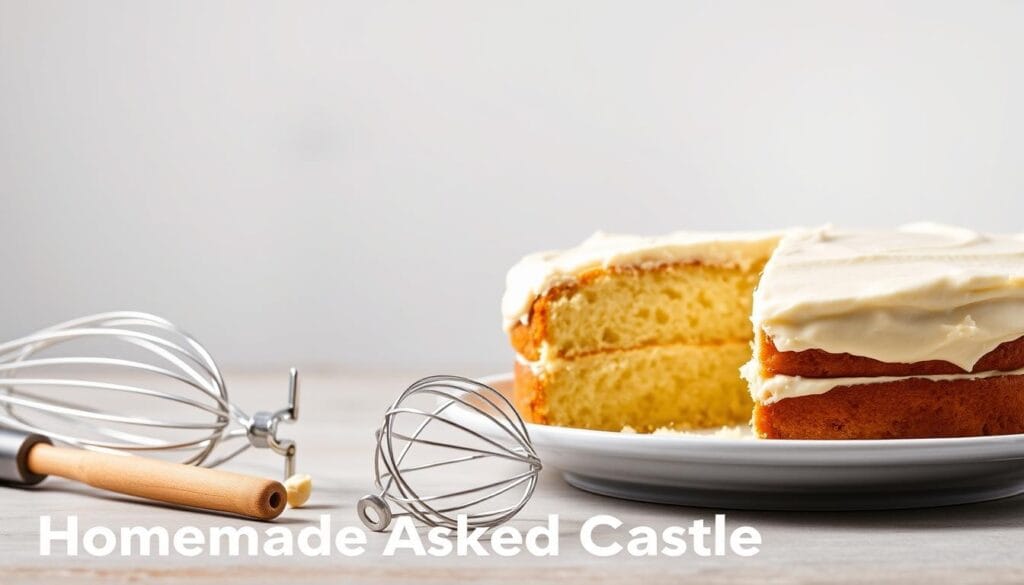
Baking a delicious vanilla cake can sometimes raise questions. Our comprehensive FAQ section addresses common concerns and provides helpful baking tips. These tips ensure your cake turns out perfectly every time.
Can I Use a Different Flavor Extract?
Absolutely! While vanilla extract is traditional, you can experiment with other flavors. Almond, coconut, or rum extract can add exciting twists to your classic vanilla cake recipe. Just remember to use the same quantity of alternative extract as you would vanilla.
- Almond extract creates a nutty flavor
- Coconut extract brings tropical notes
- Rum extract adds depth and complexity
How Can I Make My Cake Moist?
Achieving a moist cake requires attention to detail in your baking techniques. Start by using room temperature ingredients, which blend more evenly. Measure cake ingredients precisely and avoid overmixing the batter.
- Use buttermilk or sour cream
- Don’t overbake – check with a toothpick
- Brush layers with simple syrup
What If I Don’t Have Baking Powder?
No need to panic! You can create a substitute using basic baking ingredients. Mix 1/4 teaspoon of baking soda with 1/2 teaspoon of cream of tartar to replace one teaspoon of baking powder. This baking tip works great in a pinch.
Pro tip: Always check your ingredients before starting to bake. Preparation is key to creating the perfect vanilla cake every time!
Conclusion and Final Thoughts
Baking a vanilla cake is more than just following a recipe. It’s about creating a delightful family favorite that brings joy to your kitchen. This easy recipe offers a simple path to creating a delicious dessert. It will become a cherished tradition in your home.
As you’ve learned through each step, baking is an art of patience and precision. Your vanilla cake journey has equipped you with essential techniques. These techniques will help you transform basic ingredients into a mouthwatering treat.
Remember, every great baker started exactly where you are now—curious and eager to learn. Don’t be afraid to experiment with different extracts, add unique toppings, or adjust the recipe to suit your taste. Your confidence in the kitchen will grow with each cake you bake.
Your newfound baking skills are a gateway to endless culinary creativity. Whether you’re preparing a cake for a special occasion or simply enjoying a sweet moment with family, this vanilla cake recipe will remain a reliable and delicious companion in your cooking repertoire.
FAQ
Can I use a different flavor extract instead of vanilla?
Yes, you can try other extracts like almond, lemon, or coconut. Remember, each one will change the cake’s taste. Pick one that fits your flavor goal. Use the same amount as vanilla.
How can I ensure my vanilla cake stays moist?
Use room temperature ingredients and avoid overmixing. Don’t overbake. Measure everything right and check the cake early. Brushing with simple syrup after baking helps too.
What if I don’t have baking powder?
Make a substitute by mixing 1 teaspoon of baking soda with 2 teaspoons of cream of tartar. Or, use 1/4 teaspoon of baking soda with buttermilk or yogurt. This helps the cake rise.
Can I make this vanilla cake gluten-free?
Yes! Use a gluten-free flour blend instead of all-purpose flour. Make sure it has xanthan gum or add 1/2 teaspoon of xanthan gum per cup of flour. This improves texture and binding.
How long will my vanilla cake stay fresh?
Store it in an airtight container at room temperature for 3-4 days. If frosted, cover loosely and refrigerate for up to a week. Let it come to room temperature before serving for the best taste and texture.
Can I freeze vanilla cake?
Yes! Wrap unfrosted layers in plastic wrap and then foil. Freeze for up to 2-3 months. Thaw in the fridge before frosting and serving. Frosted cakes can also be frozen, but the texture might change a bit.
What’s the best way to measure flour for this recipe?
Fluff the flour in its container, then spoon it into your measuring cup. Level it off with a straight edge. Don’t scoop directly from the container to avoid compacting the flour and using too much, which can make the cake dry.

